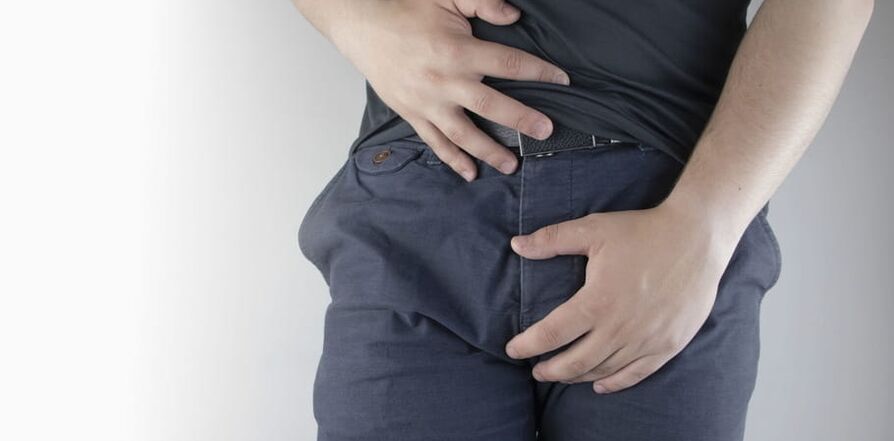For most people, varicose veins are just a pathology of the lower extremities. However, problems with blood vessels can develop in any part of the body, and intimate places are no exception for men and women. Varicose veins (varicocele) of the labia and other organs of the labia, penis and testicles are particularly troublesome.

Cause
The main factor in the development of the pathology is the genetically determined weakness of the vessel wall, in which the veins lose their tone and elasticity. Other provocative causes of lumbar varicose veins include:
- malnutrition with frequent constipation;
- chronic diseases of the urogenital system;
- intense physical activity with tension in the pelvic floor muscles and anterior abdominal wall;
- slow blood circulation in the groin due to a sedentary lifestyle;
- constriction of blood vessels and blockage of venous blood flow due to blood clots, scars, adhesions, tumors of various etiologies;
- changes in hormone levels during physical maturation, pregnancy, menopause, taking hormonal medications;
- increased load on the perineum organs in women before and after pregnancy during childbirth;
- stagnation of blood and compression of the vessels of the small pelvis and perineum due to the growth of the uterus;
- genital trauma and surgery in men and women;
- frequent urinary retention;
- systematic delay in ejaculation;
- frequent hot baths, baths, saunas.
Symptoms
In women, varicose veins affect the labia and other parts of the vulva, in men the penis is the scrotum. Depending on the location, the pathology has similar and different symptoms.
The following are common:
- spider veins in the early stages;
- protruding groin veins protruding in the perineum, which are solid to the touch, with altered topography, forming grape braids and nodules at 3-4 degrees of varicose veins;
- bluish skin tone;
- itching, burning, pain in the development of congestion;
- feeling full;
- painful feelings during intimate contact, going to the bathroom, physical exertion.
The varicose veins of the labia and vulva also have:
- Chronic pain in the waist or hips that disrupts a woman's normal life and leads to a deterioration in the psycho-emotional state: depression, increased irritability, poor sleep, neuroses.
- Hard and large vascular nodules that make it difficult to sit and move.
Sperm cord varicocele in men is accompanied by:
- asymmetry, prolapse, swelling of the scrotum on the side of the damaged testicle;
- discomfort, burning and pain while walking and minimal physical exertion;
- deterioration in the quality of intimate life to impotence and infertility.
The defeat of the penis manifests itself:
- severe swelling of the veins, even at rest;
- painful erection;
- change in skin color from dark pink to dark red with a bluish tinge;
- swelling of soft tissues;
- accurately identifies bleeding and indurations under the skin.
What is dangerous
Damage to the lumbar organs can cause serious complications and negative consequences: thickening of the blood can cause thrombosis, phlebitis, sudden bleeding caused by intercourse, or tension during defecation.
Labia and vulva
If left untreated, the disease progresses, causing complications:
- Varicothrombophlebitis is a form of thrombophlebitis that results in the loss of superficial blood vessels in the lower extremities. It causes complications in the deep and main veins and pulmonary arteries.
- Pelvic thrombosis is blood clots in the surface and deep veins that can be fatal.
As medical practice shows, bleeding associated with such pathology is rare, and situations where an inflamed vein explodes are rare but possible, especially during childbirth, so varicose veins should be treated immediately after diagnosis.
Penis
Varicose veins in the penis and sperm cord lead to deterioration in sperm quality and deterioration in erectile function. The patient’s mental health also suffers: the altered appearance of masculinity affects the emotional state, leading to the development of depression and neuroses, all the way to impotence.
Treatment
The basis of the treatment of varicose veins is the elimination of the factors that cause the development of medication and pathology - proper nutrition, sports, drinking order, weight correction.
The drugs are prescribed systemically in the form of tablets, capsules or topical ointments or creams. The following groups are prescribed: venotonics (phleboprotectors) to strengthen the vessel wall, increase the tone and elasticity of the veins, relieve edema and lymphatic stagnation, platelet inhibitors to absorb blood clots, NSAIDs to reduce inflammation and pain, antihistamines, itchingand others.
Pregnant women are advised to wear compression underwear in the form of stockings or stockings (benefit pocket), a special model of lingerie for men that keeps the testicles and penis in the right position.
Among the minimally invasive methods, sclerotherapy is recommended - the delivery of special substances into the blood vessels that bond the affected areas together and the blood passes through healthy veins, as well as laser or radiofrequency ablation, which work on a similar principle. ship.
Surgical treatment is used only after the birth of the child, if the veins have not returned to a healthy state, ie the cause of the varicose veins is not pregnancy.
In the early stages of the pathology, treatment with alternative therapies is possible: ointments, herbal decoctions, compresses and baths based on them. Be sure to consult your doctor before treating your pathology with alternative therapies.












































